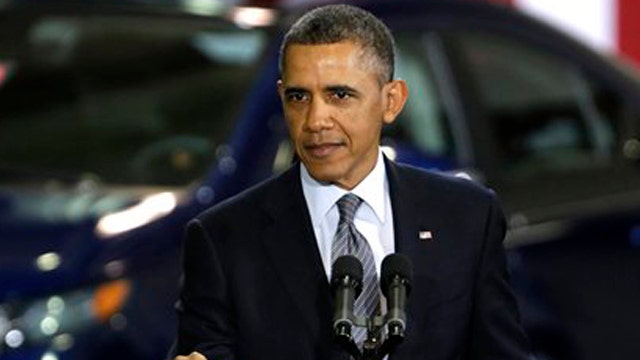To say that the pundits have low expectations for President Obama’s trip to Israel and Jordan this week would be putting it mildly. Most expect a series of photo ops, but no serious progress on the three major issues: the Iran nuclear threat, the implosion of Syria, and the moribund Israeli-Palestinian peace process.
“It is hard for me to recall a less-anticipated trip to Israel by an American president,” noted Thomas L. Friedman in his recent column in the New York Times. “But there is a message in that empty bottle: Little is expected from this trip — not only because little is possible, but because, from a narrow U.S. point of view, little is necessary.”
[pullquote]
Actually, much is necessary. The president needs to “re-set” U.S.-Israeli relations in a positive way after a contentious relationship with Israeli Prime Minister Benjamin Netanyahu in the first term. But that is the just the beginning.
There are three critical questions the president needs to answer on this trip:
- Have diplomacy, sanctions and covert operations failed to stop Iran from building nuclear weapons?
- If so, will President Obama order airstrikes against Iran, or give Israel the “green light” to hit Iran’s nuclear sites since other measures have failed?
- If not, why not?
Unfortunately, the administration has sent mixed messages in recent days.
On March 4, Vice President Joe Biden told the AIPAC Policy Conference the president is committed to preventing Iran from getting the bomb, and pointedly noted that the “window is closing” for diplomacy and sanctions work.
“Let me make clear what that commitment is: It is to prevent Iran from acquiring a nuclear weapon,” said Biden. “Period. End of discussion. Prevent — not contain —prevent….Big nations can’t bluff….And President Barack Obama is not bluffing.”
The next day, however, Secretary of State John Kerry sent different signals. He confirmed that Iran is getting closer to having nuclear weapons. He conceded that “lines have been drawn before and they've been passed. That's why the president has been so definitive this time.” But Kerry did not echo Biden’s hard line. Rather, he said the president wants to “avoid any consideration of any kind of military action.”
That same day, U.S. CENTCOM commander General James Mattis testified before the Senate Armed Services Committee. He was asked, “In your professional opinion, are the current diplomatic and economic efforts to stop Iran from obtaining nuclear weapons capability -- are they working?” His answer was blunt. “No, sir.” Then he said he was working on “other options” for the President.
Last week, President Obama was interviewed by Israel’s Channel 2. He said there is still “a year or so” until Iran builds an operational nuclear bomb.
That confused the picture even more.
Was the president indicating time is running out and that military action might need to be taken soon, or that there is still plenty of time to keep trying diplomacy and sanctions?
Mr. Netanyahu famously told the U.N. General Assembly last fall that the “red line” – the point at which Israel would be forced to launch preemptive strikes or risk allowing Tehran to get The Bomb – would be reached by spring or summer 2013. Today, senior Israeli officials confirm the red line is approaching.
“Iran’s nuclear program is advancing slower then they planned, but it is moving,” says Major General Aviv Kochavi, director of Israeli military intelligence. “At their current pace of enrichment of 14 kilograms of uranium per month, Iran would be able to manufacture five to six nuclear bombs, if the order is given.”
The problem, noted Kochavi, is that the military option that world leaders say is “on the table” is not being taken seriously by Tehran. “Iran does not see a high likelihood of an attack on its nuclear facilities by the international community,” he noted at a recent security conference in Israel.
Netanyahu is ready to launch a massive preemptive military strike soon, and alone, if need be. His new government is now in place. This includes new Defense Minister Moshe Yaalon, a former chief of staff of the Israeli Defense Forces.
Neither man wants war. They are looking for peaceful paths, and they would prefer the U.S. lead decisively. But both are unsure if they can trust the American president, and both need clarity from Washington they have not yet received.
The pundits are wrong. Much is at stake in the Mideast. Thus, much is needed from President Obama on this week’s trip -- clear answers on three critical questions, most of all.

